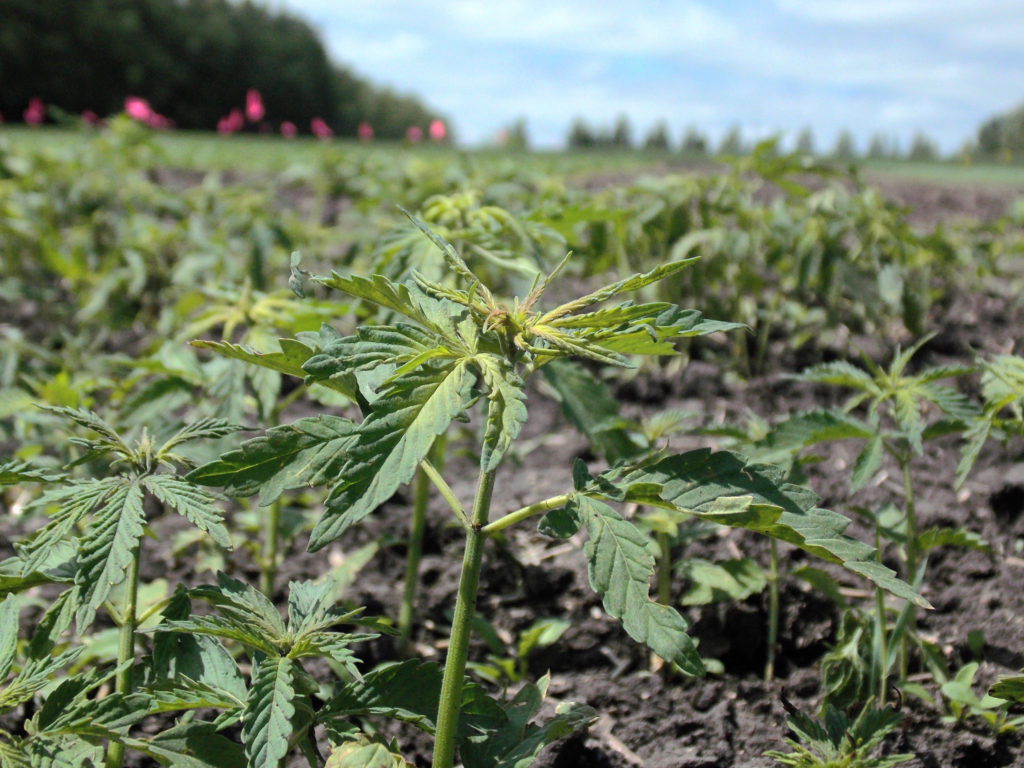Originally published on MintPress News.
AUSTIN, Texas — America’s burgeoning hemp industry faces significant barriers that can only be torn down by the full legalization of this potentially lucrative crop.
Hemp was once one of America’s essential crops, grown by presidents and cash croppers alike, and wars were fought over access to this valuable commodity. It became illegal to grow hemp in the United States with the passage of the Controlled Substances Act of 1970. The federal law bans all forms of the cannabis plant, even though industrial hemp has very low levels of THC, the main active ingredient in cannabis that’s grown for recreational or medicinal use.
The 2014 Farm Bill reopened the door to legal hemp cultivation by allowing states which had legalized industrial hemp to license farmers to grow the plant for research purposes, including market research. But many aspects of federal regulation and law surrounding hemp remain “opaque” and confusing, according to John Ryan, founder and director of Ananda Hemp. A subsidiary of the Australian hemp company EcoFibre Industries, Ananda Hemp is growing hundreds of acres of hemp in Kentucky and Tennessee.
“There’s some barriers in the regulation that still need to be sorted out for this industry to really thrive,” Ryan told MintPress News.
Twenty-five states and the District of Columbia have laws legalizing cannabis in some form, whether medicinal, recreational or agricultural, and the Drug Enforcement Agency has cooperated with the Farm Bill’s reforms, including licensing growers like Ananda Hemp. However, on the federal level, hemp remains classified by the DEA with other forms of cannabis as a Schedule I drug. It’s classified among substances like heroin and cocaine, which are considered highly addictive and lacking in medical benefits.
Ryan said this legal gray area means banks and other sources of investment capital are hesitant to invest in what they perceive to be a “high risk” industry.
“You’ve got essentially a Catch-22, where we need to deploy some serious capital to get the supply chain running, but private equity or bigger sources of capital aren’t going to get in until there’s a more clear definition of federal legislation,” he said.
This murky legal landscape is creating a struggle for vendors of hemp products, too, according to Gunhee Park, co-founder of Ministry of Hemp, an online boutique selling hemp-based products which also offers educational resources about the benefits of hemp.
Despite some initial success, Park has found that the stigma surrounding even legal hemp products makes it hard to do business. Facebook has repeatedly rejected the Ministry of Hemp’s advertisements, limiting the company’s social media reach, and payment processing companies like PayPal and Shopify have repeatedly rejected his business.
“So many of the payment processors just auto-rejected us and wouldn’t even budge when we reached back out as an appeal,” he told MintPress.
Park also noted that although some payment processors did eventually respond, “the ultimate statement is that the banks would not budge and that industrial hemp is categorized as a high-risk item.”

‘You could eventually create a billion-dollar industry here’
While most states initially opened up hemp growing only to growers associated with universities and educational institutions, Kentucky was unique in allowing licensed tobacco growers to begin experimenting with hemp.
Ananda Hemp was born when EcoFibre partnered with Brian Furnish, an eight-generation tobacco farmer, soon after the passage of the 2014 Farm Bill. Ryan explained:
EcoFibre maintains the largest industrial hemp seed bank in the world. They’ve got about 285 cultivars of cannabis and all are classified as industrial hemp, meaning they produce very little THC.
Many of those varieties were better suited for growing in the American South than more commonly available European or Canadian varieties of hemp.
Furnish grew a small test crop in partnership with Ananda Hemp in 2014. After this trial proved successful, they quickly expanded. “We did about half an acre in 2014, we’ve scaled now to 500 acres in production this year,” said Ryan.
Currently, Ananda Hemp’s biggest product is CBD extract, a medical supplement derived from industrial hemp that some studies have shown can help prevent seizures in some people with epilepsy. It may have benefits for other conditions as well. However, Ryan said CBD’s legal status highlights the issues growers currently face. Ryan explained:
The Farm Bill set up great protection for us, especially in the state of Kentucky, where the Department of Agriculture is very supportive. We have the DEA permits and the federal protection, but the Farm Bill is also very opaque when it comes to selling product over state lines, particularly if you’re looking at hemp extracts and CBD. You have this protection created by the farm bill, but at the same time, CBD is still Schedule 1.
The legal issues mean hemp growers have to build the supply chain and infrastructure of their business “from scratch,” Ryan said.
“We had to build our own harvester machine, we built our own hemp extract extraction lab,” he said. “Anyone who is coming in has to build this infrastructure from the ground up, and it’s very difficult finding anyone who wants to take that kind of risk.”
While the risk and the lack of investment capital have stymied the growth of the industry as a whole, individual companies are feeling the sting as well. Ananda Hemp had hoped to build a decorticator, a device which separates industrial hemp fibers and is the first step to creating textiles, this year, but decided postpone until next year due to uncertainties surrounding the industry. Ryan said:
We did about 100 acres of fiber hemp this year. And we are going to do about 800 acres of fiber next year and put in a basic decortication mill in Kentucky.
Despite the legal barriers, hemp’s popularity as a crop continues to grow. “You look at how well hemp has done in Canada, Europe, and China, it only makes sense that you could eventually — it’s certainly not easy — eventually create a billion-dollar industry here,” Ryan said.
Watch “Why Kentucky farmers are quitting tobacco and turning to hemp:”
‘They’re almost two different plants’
The Ministry of Hemp’s Gunhee Park told MintPress that he stumbled upon the hemp industry “quite incidentally,” coming across a hemp product without knowing anything about the plant.
“After trying it out, I realized there are all these different types of products out there, like everyday products, so from there I started researching what hemp is.”
He’s since become an evangelist for the plant, touting the benefits of hemp products. He launched Ministry of Hemp earlier this year primarily to educate people, but also to share some of his favorite products. Hemp is a high-protein food and an environmentally-friendly textile (particularly compared to cotton). It also has a range benefits in bodycare products.
The trouble for Park started just as his “ministry” started reaching a growing audience online. Facebook rejected his attempts to purchase paid advertising, and his attempts to appeal the initial rejection proved fruitless.
“They weren’t willing to listen. They were not willing to budge in the fact that they’re almost two different plants and have completely different purposes,” Park said. “It’s quite frustrating for us hemp entrepreneurs.”
Numerous online payment processing companies rejected his payments, including PayPal, Shopify and Braintree, seeming to make no distinction between psychoactive cannabis and industrial hemp. In a July 6 post to Medium.com, Park recounted how a representative of Ignite Payments told him, “Hemp is marijuana and we don’t mess around with that.”
Park noted a double standard at play, highlighting the ease with which major retailers like Wal-Mart and Amazon are able to successfully integrate hemp-based products into their inventories.
“Those bigger brands are able to get away with it because they’re not just a hemp-focused brand,” he said. “They just have hemp as a superfood included in their product offerings.”
Although Park’s story reached Forbes, neither Facebook nor transaction processors have proven willing to budge on the issue. Park has found some imperfect ways to accept payments, but he and other hemp entrepreneurs still face an uncertain future. Park said:
Every day, you’re kind of wondering, What if they shut us down today? What is our contingency plan? And most businesses, there is no contingency plan, which is sad and, I guess, dangerous, in a sense, for the business’ sustainability.

‘Some light at the end of the tunnel’
Ananda Hemp’s partner in the hemp fields, Brian Furnish, is now an advocate for the agricultural potential of hemp, appearing in the media and lobbying for legalization as part of the Kentucky Hemp Industry Council. Together, the Kentucky Hemp Industry Council and the Hemp Industries Association are lobbying the federal government to reschedule hemp and fully legalize hemp growing.
“Regulation is a definite barrier, but there is some light at the end of the tunnel hopefully,” said Ryan.
Hemp reform has bipartisan support in Congress, with both Mitch McConnell, the Republican Senate Majority Leader from Kentucky, and Ron Wyden, a Democratic Senator from Oregon, among the legislators voicing support for legal reform. As a result, Ryan suggested Congress is likely to pass some form of a “Hemp Freedom Act” in the next session. He believes this kind of legislation would “essentially legalize industrial hemp production” and pave the way for “obvious forward momentum.”
Until Congress enacts federal reform, though, the hemp industry’s growth is likely to be limited for growers, vendors and everyone in between.
“I don’t want to say we’re stalled,” Ryan said. “We’re moving at an okay clip, industry-wise, but we could be moving a little faster.”